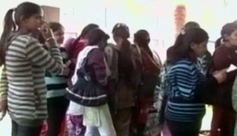
Bhiwani/Bijnor, December 10: There has been public outrage after two diktats in Haryana and Uttar Pradesh. While in Haryana, a college has banned girls from wearing jeans, in Uttar Pradesh, the Bijnor District Magistrate has asked girls not to wear black clothes at a Chief Minister event.
A women's college in the Bhiwani district in Haryana has banned girls from turning out in jeans and tops. At the Adarsh Women's College, where this diktat has been in place, the principal doesn't see anything wrong with it. Instead, she says that it's a part of respecting Indian culture as jeans and tops are all western dresses. The principal also believes that western outfits distract students from their studies and invite harassment in the form of unwanted attention.
"We have banned western clothes to groom girls according to Indian culture. Jeans and short tops invite attraction and also distracts the students, so its not allowed. Since, the students are teenagers and can misuse molbile phones, hence we have restricted them," college Principal Alka Sharma said.
The college has also banned the use of mobile phones. The National Commission for Women (NCW) has slammed the diktat and demanded action against the prinicpal. "Such diktats are uncalled for and bizarre. The government must take action against such institutes," NCW Chairperson Mamata Sharma said.
Meanwhile, women students in Bijnor have been barred from wearing black clothing and jeans at a function to be presided by Chief Minister Akhilesh Yadav. Reports say women have also been barred from wearing jeans and using mobile phones. This order has come not from any religious body, but the district magistrate of Bijnor who is a woman herslef. Locals in Bijnore are up in arms against the DM's absurd diktat.
However, the district magistrate insists the suggestion was for sober clothing and nothing else. "There is no such ban. We have just asked them to wear sober clothes. Our directive to the girls is being misinterpreted. No one has been forced to do anything," District Magistrate Sarika Mohan said.
Girl students have expressed displeasure over the diktat. "We are going to Rampur to collect our cheques. We have been asked not to wear black coloured clothes," said a student. "DM's order to not wear black burkha is unfair. I never move out of my house without wearing burkha and gloves but now I have been asked not to wear burkha," said another student.






Comments
Add new comment